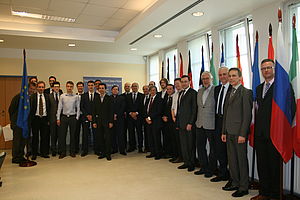Press Release
If a journey of a thousand miles begins with a single step, how does a journey around the solar system start?
The International Nuclear Power and Propulsion Spacecraft concept orbiting around Mars and Phobos moon with a payload module containing scientific, commercial and public payload bays mass up to about 20t.
The DEMOCRITOS project is a H2020 SPACE funded project, with the aim to investigate the necessary demonstration activities in order to mature technologies for high power space transportation with nuclear electric propulsion (NEP).
The project concluded its activities today, in a workshop at the Delegation of the European Union in Moscow, Russia.
The workshop saw experts from Europe and Russia exchange on the future of solar system exploration and the necessary activities in order to enable high power and high payload mass space transportation technologies that can facilitate:
- large scale deep space exploration missions (e.g. Mars, Moon, asteroids, outer planets and their moons),
- fast track manned Mars missions to reduce radiation load of astronauts,
- building of an Earth-Moon or Earth-Mars tug system and
- establish human habitats on Moon or Mars and
- deflection of dangerous Near-Earth objects like asteroids as well as collection and removal of debris in Earth orbits.
The next decades will assign new challenges to robotic and human exploration of our solar system. Experts consider that the development of high-power electric propulsion systems using nuclear power sources can significantly contribute to the implementation of deep space missions.
The DEMOCRITOS project (www.h2020-democritos.eu) was a collaboration of European and Russian teams in the field of Nuclear Electric Propulsion. The consortium members were the European Science Foundation (ESF), the French Space Agency CNES (France), the Nuclear National Laboratory (NNL/UK), the German Space Agency DLR (Germany), the Keldysh Research Centre (Russia), Thales Alenia Space Italia (TASI) and Airbus Safran Launchers (ASL/France). In addition to the members of the project consortium, experts from NASA Glenn Research Centre, the Japanese Space Agency (JAXA) and Brazil participated in various project activities and offered their input.


